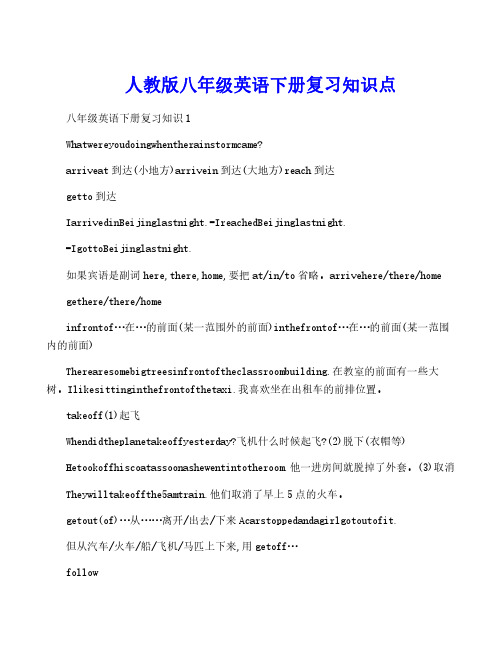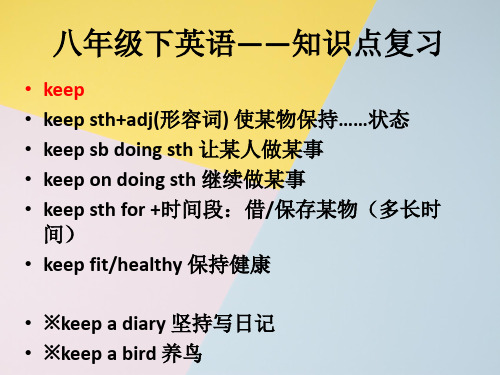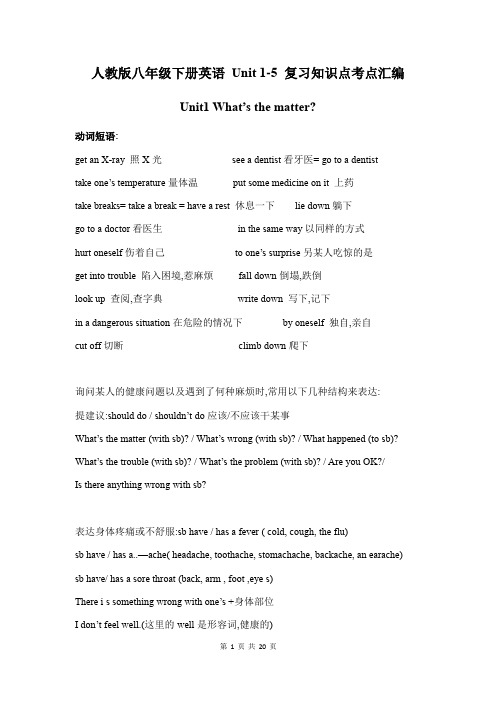精选最新人教版八年级英语下册复习全册讲义
新人教版八年级英语下册各单元知识点汇总

八年级英语下册1-----10单元知识点总结Unit 1 What’s the matter?一、基础知识1. What’ s the matter? 怎么啦?出什么事情了?【解析】matter/ ' mætə(r)) /n.问题;事情What’ s the matter with you?= What’s the trouble with you? = What’ s wrong with you? 你怎么了?【注】:matter 和trouble 为名词,其前可加the 或形容词性物主代词,wrong 是adj. 不能加the【用法】用于询问某人有什么病或某人遇到什么麻烦、问题其后跟询问对象时,与介词with连用。
即:What’s the matter with sb.? = What’s your trouble? = What’s up? = What happens to sb.?— What’s the matter with you ? — I have a bad cold.2. I had a cold.我感冒了。
have a cold=catch a cold=have the flu感冒have a fever 发烧have a cough咳嗽have a stomachache胃疼,肚子疼have a toothache牙疼have a headache头疼3. 身体部位+ache(疼痛)构成新的复合词stomach+ache=stomachache head+ache=headache tooth+ache=toothache back+ache=backache后背痛4. much too+ 形容词,意为太...... ,too much+名词,意为很多,大量。
5. enough【形容、副词】足够的/地,enough放在名前后,形副后。
good enough足够好,enough money=much money6. lie down躺下,lie 躺,躺着,过去式lay;lie说谎,过去式lied7. maybe “或许”,常用于句首,表示可能性,后加句子。
人教版八年级英语下册复习知识点

人教版八年级英语下册复习知识点八年级英语下册复习知识1Whatwereyoudoingwhentherainstormcame?arriveat到达(小地方)arrivein到达(大地方)reach到达getto到达IarrivedinBeijinglastnight.=IreachedBeijinglastnight.=IgottoBeijinglastnight.如果宾语是副词here,there,home,要把at/in/to省略。
arrivehere/there/homegethere/there/homeinfrontof…在…的前面(某一范围外的前面)inthefrontof…在…的前面(某一范围内的前面)Therearesomebigtreesinfrontoftheclassroombuilding.在教室的前面有一些大树。
Ilikesittinginthefrontofthetaxi.我喜欢坐在出租车的前排位置。
takeoff(1)起飞Whendidtheplanetakeoffyesterday?飞机什么时候起飞?(2)脱下(衣帽等)Hetookoffhiscoatassoonashewentintotheroom.他一进房间就脱掉了外套。
(3)取消Theywilltakeoffthe5amtrain.他们取消了早上5点的火车。
getout(of)…从……离开/出去/下来Acarstoppedandagirlgotoutofit.但从汽车/火车/船/飞机/马匹上下来,用getoff…follow跟随Ifollowedhimuphehill.我跟着他上了山.沿着……前进Followthisroaduntilyougettothepostoffice.顺着这条路一直到邮局.(3)听懂,理解Couldyouspeakmoreslowly?Ican’tfollowyou.你能说慢点吗?我听不(4)followsb.todosth.跟着某人做某事Pleasefollowmetoreadthestory.请跟我读这个。
人教版英语八年级下册(讲义)Unit 4 — Why don`t you talk to your parents .词句精讲精练

人教版英语八年级下册Unit 4 Why don’t you talk to your parents?词句精讲精练词汇精讲1. allowallow作动词,意为“允许”。
用法如下:(1)allow sth.意为“允许某事的发生”。
例如:I can’t allow such a thing. 我不允许发生这样的事。
(2)allow doing sth.意为“允许做某事”。
例如:We don’t allow eating in the classrooms. 我们不允许在教室吃饭。
We don’t allow smoking here. 我们不允许在此抽烟。
(3)allow sb. to do sth.意为“允许某人做某事”。
例如:Her father would not allow her to eat sweets. 她父亲不允许她吃糖果。
They don’t allow students to smoke in the classroom. 他们不允许学生在教室抽烟。
(4)allow sb. sth. 意为“给予某人某物(尤指钱或时间);让某人有(拥用或带有)某物”。
例如:He allows his son too much money. 他给他儿子的钱太多。
We’ll allow you time to answer. 我们将给你回答的时间。
2. get on withget on意为“相处,进展”,也可用get along,其后接介词with。
get on with sb. 意为“与某人和睦相处/关系良好”;get on well/badly with sth. 意为“某事进展顺利/不好”。
例如:He gets on (well) with his classmates.他和同学们相处融洽。
How do you get on with your studies?你的学业进展如何?【拓展】get on 还有“上车”的意思,后面常接bus; train等表示交通工具的词;反义词为get off。
期末知识点复习课件2022-2023学年人教版英语八年级下册

• 不定式 • learn to do sth 学会做某事 • encourage sb to do sth 鼓励某人做某事 • tell sb to do sth 告诉某人要做某事 • tell sb not to do sth 告诉某人不要做某事 • invite sb to do sth 邀请某人做某事 • invite sb not to do sth 邀请某人不做某事 • decide to do sth 决定做某事 • decide not to do sth 决定不做某事 • have to 必须don’t have to 不必 • try to do sth 尽力做某事 • try not to do sth 尽力不做某事
• so/such:如此…… • 用法如下: • such+名词短语 • so +形容词 • so many/much/few/little
• 一点儿 • a little 一点儿(修饰不可数名词和形容词) • a bit 一点儿(后接形容词) •
•
• put • put out 熄灭 • put on 穿上 • put off 下车 • put up 挂起、张贴 • put down 放下
八年级下英语——知识点复习
• keep • keep sth+adj(形容词) 使某物保持……状态 • keep sb doing sth 让某人做某事 • keep on doing sth 继续做某事 • keep sth for +时间段:借/保存某物(多长时
间) • keep fit/healthy 保持健康
• either…or…或者……或者……,连接两个主语时,谓 语动词在数的方面与or后面的主语保持一致。
(人教版)八年级下英语期中复习:知识点讲义(unit1-unit5)-精编

Unit1:What’s the matter?一.语法重点1.情态动词should的用法2.反身代词二.作文话题:谈论健康三.重要词汇句型1.have a +疾病名词(得了......病)2.询问病人病情的句型(也可用于发生了什么事)What’s wrong?What’s wrong with you?What’s your trouble?What’s the trouble with you?What’s wrong?3.4.If 引导的条件状语从句(主将从现)5.surprise:(1)surprise sb.吓到某人 (2)be surprised at对......感到吃惊 (3)be surprised to do sth.做某事令人感到吃惊 (4)in surprise惊奇地6.agree:(1)agree to do sth. 同意做某事(2)agree with sb. 同意某人(3)agree on sth.双方就某事达成一致(4)agree that+that从句同意......7.trouble:(1)get into trouble陷入困境(2)be in trouble处于困境(3)get sb. into trouble使某人陷入困境(4)have trouble with sth.在某事方面有困难(5)have trouble (in) doing sth.在做某事方面有困难e(1)be/get used to doing sth.习惯于做某事(2)used to do sth.过去常常做某事(3) sth. be used to do......某物被用来做(表被动关系)......(4)sth. be used for doing sth.某物用于/被用于做某事(强调用途)9.take a risk/take risks冒险at risk在危险中at the risk of doing sth.冒生命危险做某事10.run out(花光:物作主语) run out of(人作主语)=use up11.mean to do sth.打算做某事 mean doing sth.意味着做某事12.important(adj.)----unimportant(adj.不重要的)----importance(n.)14.cut词组:1. cut out删除;删去 2. cut up切碎 3. cut off切掉;停止4. cut down砍到;降低5. cut in插嘴;超车;插队Unit2: I’ll help to clean up the city parks.一.语法重点1.动词不定式2.动词短语二.作文话题:提供帮助,义务活动三.重要词汇句型1.volunteer:v.自愿(做某事) volunteer to do sth. volunteer for sth.n. 志愿者adj. 志愿的;自愿的 a volunteer job2.疑问词+动词不定式=宾语从句I really can’t decide where I should go.=I really can’t decide where to go.3.such+a(n) +形容词+名词=so+形容词+a(n)+名词She is such a beautiful girl.=She is so beautiful a girl.4.satisfaction(n.满意)--satisfy(v.使满意)--satisfied(adj.满意的)--satisfying(令人满意的)to one’s satisfaction使/令某人满意/满足 be satisfied with对......感到满意 be satisfied to do sth. 对做某事感到满意5.raise...for...为...筹集...6.look like外表上看起来像 take after指因血缘关系在性格,性格,行为上相像7.make/think/find/believe/feel it +形容词+to do sth. 使/觉得/发现/相信/感觉做某事......8.make a difference to对......产生影响9.imagine: (1)imagine doing sth.想象做某事(2)imagine sb. to do sth.想象某人做某事(3)imagine that/what 想象......10.train: v. 训练 n. 火车 training n.训练;培训(1)train sb./sth. to do sth.训练某人/某物去做某事(2)train sb. in sth. 在某方面训练/培养某人11.understand=follow=catch理解;听懂understanding adj.善解人意的;体谅人的12.change v. 改变;变化 change one’s life change...into...n. 零钱(不可数名词)改变(可数名词changes)13.短语:cheer up (使)变得高兴;振奋起来give out分发;散发come up with想出;提出put off推迟hand out分发call up打电话给某人;征召care for照顾;非常喜欢try out 参加.....选拔;试用take after(外貌或行为)像Unit3:Could you please clean your room?一.语法重点1.情态动词could用法(请求和征求许可)二.作文话题:对某事某物的看法(议论文)三.重要词汇句型1.in a mess乱糟糟;一团糟 make a mess of (doing) sth. 把(做)某事搞得一团糟2.so +助动词/系动词/情态动词+主语 (也)neither助动词/系动词/情态动词+主语 (也不)He will go to Hangzhou for a holiday tomorrow. So will I.3.pass v. 经过;穿过 pass the supermarket通过(考试;会议);合格或者及格 pass the final exam(时间的)过去,流逝 A year passed quickly.4.borrow sth. borrow sth. from sb. (借进:说话人向别人借东西)lend sb. sth. lend sth. to sb. (借出:说话人把自己的东西借给别人keep“借”或“保留”多长时间,与一段时间连用5.make:(1)make sb. do sth. I made my mother laugh.(2)make+宾语+形容词(宾语补足语) I made my mother sad.6.waste: a waste of 浪费 a waste of moneywaste sth.浪费某物 waste sth. in doing sth.浪费......做某事7.provide 提供;供应provide sb. with sth.= provide sth for sb.supply sb. with sth.=supply sb. with sth.offer sb. sth=offer to do sth.8.develop(v.发展)--developed(adj.发达的)--developing(adj.发展中的)--development(n.发展)develop one’s interest in培养某人对......的兴趣9.drop与fall 落下;掉下;降下(作不及物动词时,一般可互换)drop还可作及物动词,而fall 不可10.短语:depend on依靠;依赖take care of 照顾;处理Unit4: Why don’t you talk to your parents?一.语法重点1.提建议和回答提建议的表达方式2.until, so that及although引导的状语从句二.作文话题:就某一现象提建议三.重点词汇句型1.allow sb. to do sth.允许某人做某事allow doing sth.允许做某事2.find sb. doing sth.发现某人正在做某事 find sb. to do sth. 发现某人做了某事3.get on (well/badly)with sb. 与某人相处的好/坏4.argue with sb. about sth. 为某事与某人争论5. instead与instead of6.特殊疑问词+ever=no matter+特殊疑问词 however=no matter how7.offer to do sth.主动提出做某事 offer sb. sth.=offer sth. to sb.给某人提供某物municate with sb.与某人沟通,交流communicate sth. to sb.把......通知/传达给某人9.return sb. sth= return sth. to sb.=give back10.not ...any more(不再)=no morenot...any longer=no longer(不再)11.put pressure on sb.向某人施压pete with/against sb.和某人竞争13.continue/go on doing sth.继续做同一件事continue/go on to do sth.继续做某事(不是同一件事)pare A with B把A与B做对比/比较(用来比较相似事物的不同点)compare A to B把A比作B(用来比较不同事物间的相同点)16.cause sb. to do sth.促使某人做某事cause sth. (to/for sb.)(给某人)带来......17. 词组:look through快速查看;浏览work out成功的发展;解决get on with和睦相处;关系良好cut out删除;删去compare...with比较;对比Unit5: What were you doing when the rainstorm came?一.语法重点1.过去进行时2.when与while的区别二.作文话题:描述过去发生的某件事三.重点词汇句型1.light: 1)n. 光;光线(不可数名词) 2)n. 电灯;光源(可数名词)3)adj.轻的;浅色的4)v. 点燃;照亮 light---lighted/lit---light/lit2.report v.报告 n. 报告 reporter n. 记者3.wood n. 木头;木(不可数名词)小树林(可数名词,常用复数)wooden adj.木制的4.beat 1)v. 击打 2)心脏等跳动 3)打败;战胜(后接人或由人组成的队)5.against 1)反对 for支持 We are against war and for peace.2)靠着,倚着 The boy stood against the door.6.rise与raise7.realize v. 1)意识到;认识到2)实现(梦想、愿望)realize one’s dream=make one’s dream come true=achieve one’s dream8.make one’s way to......在某人去......的路上,前往......途中9.短语:at first 起初;起先fall asleep进入梦乡;睡着die down逐渐变弱;逐渐消失make one’s way前往;费力地前进take down拆除,往下拽;记录go off水电断掉;离开;爆炸;食物变坏。
Unit9单元讲义人教版八年级英语下册

Unit9 Have you ever been to a museum?单词短语及重点句型一、单词讲解1 somewhere adv.在某处;到某处somewhere 不定副词,意为“某地”。
go somewhere different 意为“去与众不同的某地,去某个独特的地方”。
I want to go somewhere different and live alone. 我想去一个与众不同的地方独自生活。
拓展:由some, any, no, every分别加上where构成的副词叫不定副词。
即:somewhere 某个地方, anywhere 任何地方, nowhere 无处,哪里都不, everywhere 每个地方。
2 invent v.发明;创造1)invent 作动词,意为“发明;创造”。
Edison invented the light bulb. 爱迪生发明了电灯。
2)invent还可以表示“虚构”。
The whole story was invented. 整个故事是虚构的。
3)invent的名词形式有两个,一个是inventor(发明者;发明家),另一个是invention(发明物)。
Edison is a great inventor in history. 爱迪生是历史上伟大的发明家。
辨析:invent和discover的辨析:①invent 意为“发明,发明之物”指“从无到有”。
Alexander Graham Bell invented the telephone in 1876. 亚历山大•格雷厄姆•贝尔在1876年发明了。
②discover 意为“发现”,指“本来就已经存在,但不为人知”的事物。
Columbus discovered America in 1492. 哥伦布在1492年发现了美洲。
3 unbelievable adj.难以置信的;不真实的unbelievable作形容词,意为“难以置信的;不真实的”,是由believable“可相信的;可信任的”加否定前缀un派生而来的。
初中英语 人教版八年级下册期末总复习(讲练+习题含答案,共104张PPT)

3. I think there will be more / less pollution. 我认为将会有更多/更少的污染。
fewer与less及more表数量的用法。
(3)many“许多”,修饰可数名词。 much“许多”,修饰不可数名词。
many / much比较级、最高级为不规则变化:many / much-more-most
“a few”表示“一些”+可数名词
例:a few days ago, for a few weeks, He has few friends here. There will be fewer trees.
3. I think there will be more / less pollution. 我认为将会有更多/更少的污染。
He went home after two days. 他两天后回家了。 Three years later,she had a baby. 三年后,她生了一个婴儿。
fall in love with 爱上… fall in love with a girl 爱上一个女孩 fall in love with a country 爱上一个国家
例:I have many magazines. She has more magazines. But he has the most. There will be more people on the earth in future. More and more students start to exercise more every day to keep fit.
典例展示 2.About Pollution
Tina: There is much pollution around us.
人教版八年级下册英语 Unit 1-5 复习知识点考点汇编

人教版八年级下册英语U nit 1-5 复习知识点考点汇编Unit1 What’s the matter?动词短语:get an X-ray 照X光see a dentist看牙医= go to a dentist take one’s temperature量体温put some medicine on it 上药take breaks= take a break = have a rest 休息一下lie down躺下go to a doctor看医生in the same way以同样的方式hurt oneself伤着自己to one’s surprise另某人吃惊的是get into trouble 陷入困境,惹麻烦fall down倒塌,跌倒look up 查阅,查字典write down 写下,记下in a dangerous situation在危险的情况下by oneself 独自,亲自cut off切断climb down爬下询问某人的健康问题以及遇到了何种麻烦时,常用以下几种结构来表达:提建议:should do / shouldn’t do应该/不应该干某事What’s the matter (with sb)? / What’s wrong (with sb)? / What happened (to sb)? What’s the trouble (with sb)? / What’s the problem (with sb)? / Are you OK?/Is there anything wrong with sb?表达身体疼痛或不舒服:sb have / has a fever ( cold, cough, the flu)sb have / has a..—ache( headache, toothache, stomachache, backache, an earache) sb have/ has a sore throat (back, arm , foot ,eye s)There i s something wrong with one’s +身体部位I don’t feel well.(这里的well是形容词,健康的)Let’s +动词原形./ What (How) about doing sth ? / Why not ( Why don’t you ) do? You’d better do / You’d better not do 最好干某事/最好不要干某事too much + 不可数名词:too much homework 动词+too much : talk too muchtoo many+可数名词复数:too many students much too + adj/ adv : much too tiredhot tea with honey 加蜂蜜的热茶(这里的with是后置定语,修饰tea)away from :远离Stay away from fire.远离火A地离B地的具体距离具体的距离+away from : My home is 500 meters away from my school.Far from:A地离B地很远My home is far from my school.(具体多远不知道)lie 动词,躺、位于,过去式lay , 过去分词lain, 现在分词lying动词,说谎,过去式lied, 过去分词lied, 现在分词lying名词,谎言tell a lie = tell lies说谎lay 动词,下蛋,产卵,放置,过去式laid, 过去分词laid, 现在分词layingsee sb doing sth看见某人正在干某事see sb do sth看见某人干某事的全过程shout for help 大声呼救shout at sb对某人大喊大叫shout to sb对某人大声说话without thinking twice毫不犹豫,不假思索get on 上车get off 下车(大型交通工具)get into / get out of (电梯、出租车等小型交通工具)expect sb to do sth期待某人干某事expect sb not to do sth期待某人不要干某事agree to do sth同意干某事thanks to 多亏了,幸亏= because of = with the help ofin time 及时on time 按时,准时right away=right now = at once立即马上think of想起,认为think about 考虑think about doing sth考虑干某事think over 仔细考虑hit sb in / on +身体部位(软的部位用in,硬的部位用on)run it under water用水冲洗put a bandage on it 用绷带包扎Knives are used to cut things.have trouble (in) doing sth = have problems/difficulty (in) doing sth干某事有麻烦/问题/ 困难have trouble with sth= have problems with sth = have difficulty with sth在某方面有困难be / get used to doing sth 习惯于干某事I am used to getting up early.我习惯了早起used to do sth过去常常干某事(暗示现在不干了)I used to get up early. (暗示现在不。
- 1、下载文档前请自行甄别文档内容的完整性,平台不提供额外的编辑、内容补充、找答案等附加服务。
- 2、"仅部分预览"的文档,不可在线预览部分如存在完整性等问题,可反馈申请退款(可完整预览的文档不适用该条件!)。
- 3、如文档侵犯您的权益,请联系客服反馈,我们会尽快为您处理(人工客服工作时间:9:00-18:30)。
→__d_if_fi_c_u_l_t ___ adj. 困难的
39. ___o_p_e_n_______ v. 开;打开 →__cl_o_s_e______ v. 关 (反义词)
5. __li_e_____ v. 躺;平躺 → _l_a_y_______ 过去式 → __la_i_n______ 过去分词 → __ly_i_n_g_____ 现在分词
6. ___r_e_s_t______ v. & n. 放松;休息 7. ___co_u__g_h_____ v. & n. 咳嗽 8. __h__u_r_t _____ v. (使)疼痛;受伤
(优选)最新人教版八年级英 语下册复习课件全册
(一)单词
1. ___s_o_r_e_______ adj. 疼痛的;酸痛的 2. __st_o_m__a_ch__a_ch__e_ n. 胃痛;腹痛
→ _t_o_o_t_h_a_c_h_e___ n. 牙痛 → __h_e_a_d_a_c_h_e___ n. 头痛 3. ___f_oo_t_________ n. 脚;足 → __f_e_e_t_______ 复数 4. __fe_v_e_r_____ n. 发烧
→ __h_u_r_t____ 过去式/过去分词 9. _o_f_f______ adv. & prep. 离开(某处);
不工作;从……去掉
10. ___o_n______ prep. 向;朝 11. ____h_it______ v. (用手或器具)击;打
→ _h_i_t_____ 过去式/过去分词 12. __h_e_r_se_l_f__ pron. (she的反身代词)她自己
使人激动的 →_e_x_c_it_e_m__e_n_t_ n. 激动;兴奋
43. __k_i_n_d_n_e_s_s___ n. 仁慈;善良 →_k_i_n_d_______ adj. 善良的;仁慈的
44. ___c_le_v_e_r_____ adj. 聪明的;聪颖的 45. __u_n_d_e_r_s_ta_n_d___ v. 理解;领会
→__b_r_e_a_k_____ v. 打碎 →__b_r_o_k_e_____ 过去式 →__b_r_o_k_e_n____ 过去分词
34. _d_is_a_b_l_ed____ adj. 丧失能力的;有残疾的 →_d_i_s_a_b_le_____ v.使无能力; 使残废,
35. ___b_l_in__d_____ adj. 瞎的;失明的 36. ___d_e_a_f______ adj. 聋的 37. __i_m_a_g_i_n_e____ v. 想象;设想
40. __c_a_r_r_y_______ v. 拿;提;扛 41. ___tr_a_i_n_______ v. 训练;培训
→__t_ra_i_n_i_n_g___ n. 训练;培训 42. __e_x_c_i_te_d______ adj. 激动的;兴奋的
→_e_x_c_it_e______ v. 使兴奋;使激动 →_e_x_c_it_i_n_g____ adj. 令人兴奋的;
16. _s_u_n_b__u_r_n_e_d_ adj. 晒伤的 17. ___cl_i_m_b_e_r____ n. 登山者;攀登者
→_c_l_im__b_____ v. 攀登 18. __r_i_sk________ v. & n. 危险;风险;冒险 19. __k_n_i_fe_______ n. 刀
→ _o_u_r_se_l_v_e_s_ pron. (we的反身代词) 我们自己
13. ___p_r_e_ss_____ v. 压;挤;按 14. __s_ic_k_______ adj. 生病的;有病的
→ _i_ll______ 近义词
15. __b_r_e_aபைடு நூலகம்th_e____ v. 呼吸 → _b_r_e_a_th____ n. 呼吸
23. __d_e_a_t_h________ n. 死;死亡 →__d_e_a_d_______ adj. 死的
24. __v_o_l_u_n_t_ee_r_____ v. 义务做;自愿做 n. 志愿者
25. __lo_n_e_l_y______ adj. 孤独的;寂寞的 →__lo_n_e________ adj. 孤单的;单独的 →_a_l_o_n_e_______ adv. 独自;单独
→_u_n_d_e_r_s_t_o_o_d_ 过去式/过去分词 46. ___c_h_a_n_g_e_____ v. & n. 变化;改变 47. ___in_t_e_r_es_t_____ n. 兴趣;关注
26. __se_v_e_r_a_l______ pron. 几个;数个;一些 27. __s_tr_o_n_g_______ adj. 强烈的;强壮的 28. _s_a_ti_s_fa_c_t_io_n____ n. 满足;满意
→_s_a_t_is_f_y_____ v. 使满意;满足 →__sa_t_i_sf_ie_d____ adj. 感到满意的
29. __o_w__n_e_r_____ n. 物主;主人 →__o_w_n______ adj. 自己的
30. ___r_a_is_e_______ v. 募集;征集 31. ___re_p_a_i_r______ v. 修理;修补 32. ___fi_x_________ v. 修理;安装 33. __b_r_o_k_e_n______ adj. 破损的;残缺的
→__k_n_iv_e_s____ 复数 20. __m__e_a_n______ v. 意思是;打算;意欲
→_m__e_a_n_t____ 过去式/过去分词
21. _i_m_p_o_r_t_a_n_c_e__ n. 重要性;重要 →_i_m_p_o_r_t_a_n_t___ adj. 重要的
22. _d__ec_i_s_io_n_____ n. 决定;抉择 →__d_ec_i_d_e______ v. 决定
